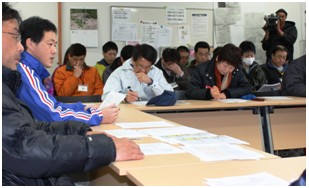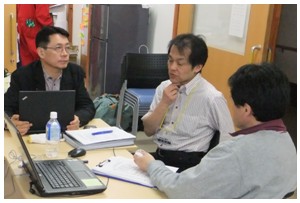Miyagi Support Center News "Link (Yui)" No. 4, April 15, 2011
“Let’s support our fellows in Tohoku with our bonds of friendship and strengths.”
Issued by the Miyagi Support Center of the Japan Disability Forum (JDF) HQs for the Support of Persons with Disabilities affected by the East Japan Great Earthquake.
Office: c/o Sendai Work Campus, Taihaku-ku, Sendai city.
Phone and fax: +81-22-306-4663
Following the survey visits to support centers/facilities for persons with disabilities, we have started a set of new programs including needs assessment of individuals with disabilities and their family members living in shelters or at home. Involving public health nurses working in the community as key contact persons, we verify the whereabouts of individuals with disabilities and find out their needs in collaboration with local governments. Besides, collaborating with related organizations working in the prefecture, we deliver supplies and materials in response to the requests for support made to us at the survey visits. Having such programs to be recognized as good precedent examples in our activities, we will make use of them in future activities.
Start of visit program for life-oriented assessment in collaboration with local government.
Collaborating with municipal public health nurses in Higashi Matsushima city, we started new program to verify the whereabouts of individuals with disabilities and find out their needs having the public health nurses visit them one by one in the community. A person with hearing disability we got to know through the program said that she/he did not know it until four days later the earthquake outbreak that tsunami had hit coast part of the quake-striken areas leaving serious influences although it was partly because of the prolonged black-out after the earthquake. Another person with disability said that she/he stayed at her/his relatives' houses because she/he didn't want to trouble others and rather avoid going to the shelter.
In the other city, a wheel-chair user whom we got to know said a similar story; she/he rather avoided going out of the shelter because she/he didn't want to trouble other people living there. The earthquake broke her/his spare wheel-chair for out-door use and made her/him difficult to change wheel-chairs for going out. To follow up this story, we made necessary arrangements for providing her/him with a spare wheel-chair in coordination with a relevant organization. Local-government-run temporary welfare shelters accept those who require adequate care for their daily living including persons with disabilities; however, it is reported that limitations in their capacity and insufficiency of necessary materials made them difficult to cope enough with the demands.
As such, the collaborations with the local governments made us capable to conduct more life-oriented needs assessment program. From now on, we will continue emergency support activities and try to assess more concrete situation as well, so that we can clarify such problems as restrictions in communication measures at emergency or surroundings of shelters.
Upper House members, Hiroyuki Tani, the chief of the project team for persons with disabilities, the Democratic Party of Japan and Tomiko Okazaki, the DPJ's Special Committee chairperson on Disaster accompany to our visit program.
Upper House members, Hiroyuki Tani and Tomiko Okazaki, who have leading disability-related policy-making measures in the government ruling party, visited the Support Center and attended the morning meeting. Then, Tani accompanied with our team to Higashi Matsushima city, where they met public health nurses for visit program. Tani listened to such demands as urging building temporary housings from the victims. Tani had managed to bring trucks from Tochigi loading with relief goods rarely available in the daily life at shelters such as fresh vegitables and distributed them to the victims. Okazaki accompanied with another team for distribution of relief goods, which were given to our Center by collaborating organizations. Taking this opportunity, Okazaki shared and exchanged information with the team members regarding how to choose necessary items for daily living such as clothes. We would like to expect the both Upper House members will take what they listened to and were requested from the victims into their consideration for the support measures for the persons with disability for the sake of reconstruction of their living activities.

Upper House members, Tani and Okazaki listening to the Miyagi Support Center office staff.
From the surveys diary:
〈Surveys in remote islands of Shiogama city: needs assessment in four islands. 〉
On April 12, information of the situation of shelters in the remote islands and of the reopening of ferry services were given to our team that had conducted hearing visits at shelters in the main land of Shiogama city. Our team members agreed at the meeting on that day to make a ferry trip to the islands, if possible. On April 13, the team went to each of four islands to visit shelters there. Having conducted hearing surveys at three locations, it was commonly found that quake-effected lifeline systems had not yet recovered at all there, and islanders were supplied necessary goods for their living through transportation by their boats or public regular shipping services specially for relief goods. Although our team had little opportunities to listen to persons with disabilities themselves, their whereabouts were verified through community relations in the islands. The municipality begun coping with the problems in the islands. However, so many problems still remain such as urgent needs of the recovery of lifeline systems.
Hard time for the municipality to cope on the provision day of disability pension.
We gathered latest information at the Ishinomaki city hall for hearing visits to shelters in the city where people suffered serious damage by the disaster. The city hall Disability Welfare section officials informed us of the recent problems in their welfare system management, saying "We have a hard time to cope with many disability pension recipients who lost their bankbooks, while it is reaching the provision day of disability pension (April 15)" and "We have recognised so many elderly and disabled persons who require to be supported by the adult guardianship system." Along with on-going post-disaster restoration projects and for the sake of alleviation of hardship of the victims, more supports from the prefecture and the nation are urgently required to reinforce the staff at the city halls and centers/facilities working for the support of the lives of victims and to allow flexible Welfare system managements at local levels.
From the office: 90 persons from all over Japan have been active for us up to April 10th.

JDF Secretary-General Fujii discussing with office staff on the Center's action program
●Katsunori Fujii, the Chair of the Executive Board of Japan Disability Forum (JDF), came to visit Miyagi Support Center as a part of his monitoring mission to all JDF centers in Fukushima, Miyagi and Iwate prefectures. Fujii attended the daily evening meeting on that day and confirmed our main action program in the future plan as being the survey program of persons with disabilities at their places of living.
●The Center continues to visit shelters and centers/facilities after the first hearing survey and also performs publicity work such as issuing press release documents and making poster information sheets for distribution. We were interviewed by Kahoku Shimpou and NHK (Japan Broadcasting Corporation) and also by the Associated Press (U.S.A). We welcome the requests of interview from press reporters so that difficulties of the lives of persons with disabilities affected by the disaster can be widely reported thorough the news media.
●On April 13, ten members from Japanese Association for an Inclusive Society visited the Miyagi Support Center. Setting up "Assessment and Support Committee for Reconstruction in Quake-hit Areas", the association is going to discuss and find out what support they can provide persons with disabilities and elderly people, said the members.
Activity record:
- April 10 (Sunday): Started needs assessment at centers/facilities and shelters in inland areas following the completion of the first round of needs assessment in coastal areas. April 11 (Monday): Organised our teams to fix each team's area in charge for information gathering and hearing visits for needs assessment in shelters and centers/facilities.
- April 12 (Tuesday): Welcomed the interview request from the Associated Press as there had been little news regarding problems persons with disabilities had. In the interview we conveyed our message with the result and progress of our first hearing survey and needs assessment.
- April 13 (Wednesday): Started new action programs such as a survey trip to remote islands in Shiogama city and collaboration with public health nurses in Higashi Matsushima city.
- April 14 (Thursday): Coordinated for information gathering with local district welfare officers and social work centers.
To rebuild better lives of persons with disabilities in communities
we need people with cars who can support our work!
Translated by the Japanese Society for Rehabilitation of Persons with Disabilities
Volunteer translator : Mr. Isamu Konishi
